(4年高考)江苏省2011-2014年高考英语真题汇编 任务型阅读
- 格式:doc
- 大小:889.00 KB
- 文档页数:10
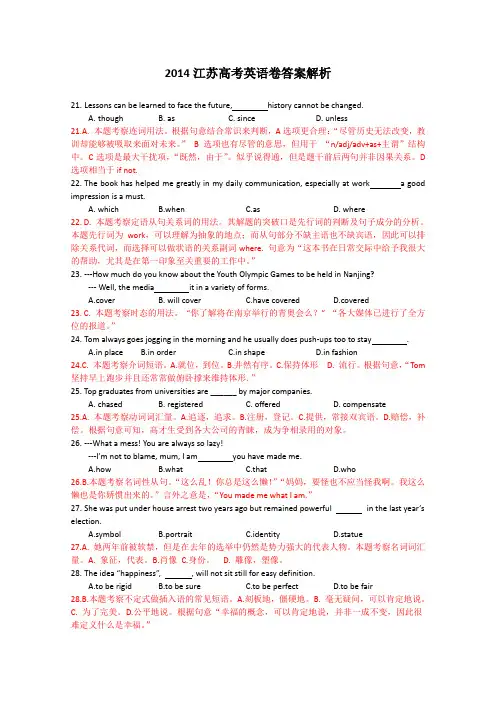
2014江苏高考英语卷答案解析21.Lessons can be learned to face the future, history cannot be changed.A.thoughB. asC. sinceD. unless21.A. 本题考察连词用法。
根据句意结合常识来判断,A选项更合理:“尽管历史无法改变,教训却能够被吸取来面对未来。
”B选项也有尽管的意思,但用于“n/adj/adv+as+主谓”结构中。
C选项是最大干扰项,“既然,由于”。
似乎说得通,但是题干前后两句并非因果关系。
D 选项相当于if not.22.The book has helped me greatly in my daily communication, especially at work a good impression is a must.A. whichB.whenC.asD. where22. D. 本题考察定语从句关系词的用法。
其解题的突破口是先行词的判断及句子成分的分析。
本题先行词为work,可以理解为抽象的地点;而从句部分不缺主语也不缺宾语,因此可以排除关系代词,而选择可以做状语的关系副词where. 句意为“这本书在日常交际中给予我很大的帮助,尤其是在第一印象至关重要的工作中。
”23.---How much do you know about the Youth Olympic Games to be held in Nanjing?--- Well, the media it in a variety of forms.A.coverB. will coverC.have coveredD.covered23. C. 本题考察时态的用法。
“你了解将在南京举行的青奥会么?”“各大媒体已进行了全方位的报道。
”24.Tom always goes jogging in the morning and he usually does push-ups too to stay .A.in placeB.in orderC.in shapeD.in fashion24.C. 本题考察介词短语。
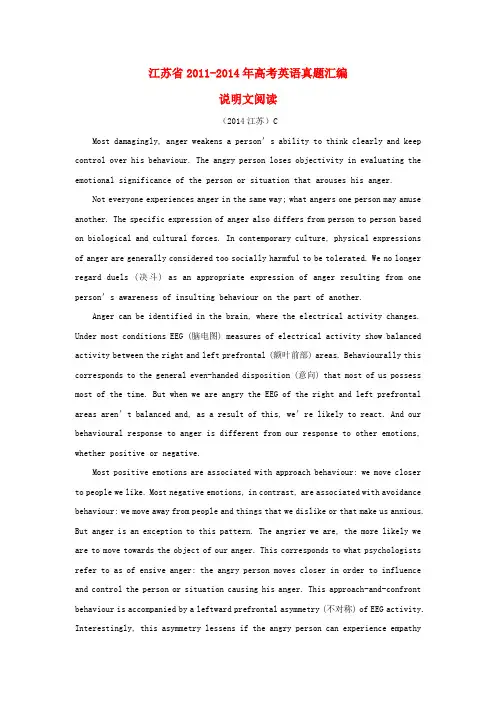
江苏省2011-2014年高考英语真题汇编说明文阅读(2014江苏)CMost damagingly, anger weakens a person’s ability to think clearly and keep control over his behaviour. The angry person loses objectivity in evaluating the emotional significance of the person or situation that arouses his anger.Not everyone experiences anger in the same way; what angers one person may amuse another. The specific expression of anger also differs from person to person based on biological and cultural forces. In contemporary culture, physical expressions of anger are generally considered too socially harmful to be tolerated. We no longer regard duels (决斗) as an appropriate expression of anger resulting from one person’s awareness of insulting behaviour on the part of another.Anger can be identified in the brain, where the electrical activity changes. Under most conditions EEG (脑电图) measures of electrical activity show balanced activity between the right and left prefrontal (额叶前部) areas. Behaviourally this corresponds to the general even-handed disposition (意向) that most of us possess most of the time. But when we are angry the EEG of the right and left prefrontal areas aren’t balanced and, as a result of this, we’re likely to react. And our behavioural response to anger is different from our response to other emotions, whether positive or negative.Most positive emotions are associated with approach behaviour: we move closer to people we like. Most negative emotions, in contrast, are associated with avoidance behaviour: we move away from people and things that we dislike or that make us anxious. But anger is an exception to this pattern. The angrier we are, the more likely we are to move towards the object of our anger. This corresponds to what psychologists refer to as of ensive anger: the angry person moves closer in order to influence and control the person or situation causing his anger. This approach-and-confront behaviour is accompanied by a leftward prefrontal asymmetry (不对称) of EEG activity. Interestingly, this asymmetry lessens if the angry person can experience empathy(同感) towards the individual who is bringing forth the angry response. In defensive anger, in contrast, the EEG asymmetry is directed to the right and the angry person feels helpless in the face of the anger-inspiring situation.61. The “duels”example in Paragraph 2 proves that the expression of anger ________.A. usually has a biological basisB. varies among peopleC. is socially and culturally shapedD. influences one’s thinking and evaluation62. What changes can be found in an angry brain? ZXXKA. Balanced electrical activity can be spotted.B. Unbalanced patterns are found in prefrontal areas.C. Electrical activity corresponds to one’s behaviour.D. Electrical activity agrees with one’s disposition.63. Which of the following is typical of offensive anger?A. Approaching the source of anger.B. Trying to control what is disliked.C. Moving away from what is disliked.D. Feeling helpless in the face of anger.64. What is the key message of the last paragraph?A. How anger differs from other emotions.B. How anger relates to other emotions.C. Behavioural responses to anger.D. Behavioural patterns of anger.61. C 62. B 63. A 64. D(2013江苏)CIf a diver surfaces too quickly, he may suffer thebends. Nitrogen (氮) dissolved (溶解) in his blood issuddenly liberated by the reduction of pressure. Theconsequence, if the bubbles (气泡) accumulate in a joint,is sharp pain and a bent body—thus the name. If the bubblesform in his lungs or his brain, the consequence can be death.Other air-breathing animals also suffer this decompression (减压) sickness if they surface too fast: whales, for example. And so, long ago, did ichthyosaurs. That these ancient sea animals got the bends can be seen from their bones. If bubbles of nitrogen form inside the bone they can cut off its blood supply. This kills the cells in the bone, and consequently weakens it, sometimes to the point of collapse. Fossil (化石) bones that have caved in on themselves are thus a sign that the animal once had the bends.Bruce Rothschild of the University of Kansas knew all this when he began a study of ichthyosaur bones to find out how widespread the problem was in the past. What he particularly wanted to investigate was how ichthyosaurs adapted to the problem of decompression over the 150 million years. To this end, he and his colleagues traveled the world’s natural-history museums, looking at hundreds of ichthyosaurs from the Triassic period and from the later Jurassic and Cretaceous periods.When he started, he assumed that signs of the bends would be rarer in younger fossils, reflecting their gradual evolution of measures to deal with decompression. Instead, he was astonished to discover the opposite. More than 15% of Jurassic and Cretaceous ichthyosaurs had suffered the bends before they died, but not a single Triassic specimen (标本) showed evidence of that sort of injury.If ichthyosaurs did evolve an anti-decompression means, they clearly did so quickly—and, most strangely, they lost it afterwards. But that is not what Dr Rothschild thinks happened. He suspects it was evolution in other animals that caused the change.Whales that suffer the bends often do so because they have surfaced to escape a predator (捕食动物) such as a large shark. One of the features of Jurassic oceans was an abundance of large sharks and crocodiles, both of which were fond of ichthyosaur lunches. Triassic oceans, by contrast, were mercifully shark- and crocodile-free. In the Triassic, then, ichthyosaurs were top of the food chain. In the Jurassic and Cretaceous, they were prey (猎物) as well as predator—and often had to make a speedy exit as a result.61. Which of the following is a typical symptom of the bends?A. A twisted body.B. A gradual decrease in blood supply.C. A sudden release of nitrogen in blood.D. A drop in blood pressure.62. The purpose of Roths child’s study is to see ______.A. how often ichthyosaurs caught the bendsB. how ichthyosaurs adapted to decompressionC. why ichthyosaurs bent their bodiesD. when ichthyosaurs broke their bones63. Rothschild’s finding stated in Paragraph 4 ______.A. confirmed his assumptionB. speeded up his research processC. disagreed with his assumptionD. changed his research objectives64. Rothschild might have concluded that ichthyosaurs ______.A. failed to evolve an anti-decompression meansB. gradually developed measures against the bendsC. died out because of large sharks and crocodilesD. evolved an anti-decompression means but soon lost it61. A 62. B 63. C 64. A(2012江苏)BDeputy Agriculture Secretary Kathleen Merrigan sees an epidemic (流行病) sweeping across Americas farmland. It has little to do with the usual challenges, such as flood, rising fuel prices and crop-eating insects. The country's fanners are getting older, and there are fewer people standing in line to take their place. National agricultural census (普查) figures show that the fastest-growing group of fanners is the part over 65. Merrigan is afraid the average age will be even higher when the 2012 statistics are completed.Merrigan, a former college professor, is making stops at universities across the country in hopes of encouraging more students to think about careers in agriculture. Aside from trying to stop the graying of .America's farmers, her work is made tougher by a recent blog posting that put agriculture at No.1 on a list of "useless" college degrees. Top federal agriculture officials are talking about the posting, and it has the attention of agricultural organizations across the country. “There couldn't be anything that's more incorrect," Merrigan said. "We know that there aren't enough qualified graduates to fill the jobs that are out there in American agriculture.In addition, a growing world population that some experts predict will require 70% more food production by 2050, she said.“I truly believe we're at a golden age of agriculture. Global demand is at an all-time record high, and global supplies are at all-time record lows," said Matt Rush, director of the Texas Farm Bureau. "Production costs are going to be valuable enough that younger people are going to have the opportunity to be involved in agriculture. "The Department of Agriculture has programs aimed at developing more farmers and at increasing interest in locally grown food. The National Young Farmers' Coalition has also been pushing for state and federal policy changes to make it easier for new farmers.Ryan Best, president of Future Fanners of America, has been living out of a suitcase, traveling the country and visiting with high school students about careers in agriculture. The 21 -year-old Best hopes his message-that this is a new time in agriculture-will motivate the next generation to turn around the statistics. Never before have we had the innovations ( 创新) in technology which have led to agriculture in this country being the most efficient it has ever been,” he said. “there’s really a place for everybody to fit in.”59. What is the new challenge to American agriculture?A. Fewer and older farmers.B. Higher fuel prices.C. More natural disasters.D. Lower agricultural output.60.Why is Merrigan visiting universities across the country?A. To draw federal agriculture officials' attention.B. To select qualified agriculture graduates.C. To clarify a recent blog posting.D. To talk more students into farming careers61. According to Matt Rush, American agriculture will provide opportunities for younger people because__________.A. the government will cover production costsB. global food supplies will be even lowerC. investment in agriculture will be profitableD. America will increase its food export62. What do the underlined words "to turn around the statistics" in the last paragraph mean?A. To re-analyze the result of the national census.B. To increase agricultural production.C. To bring down the average age of farmers.D. To invest more in agriculture.【考点】科技类—说明文【文章大意】本文是一篇科技文,主要介绍了美国在农业方面临农民人数少,年龄偏大的问题,同时还缺少专业大学生从事农业生产。
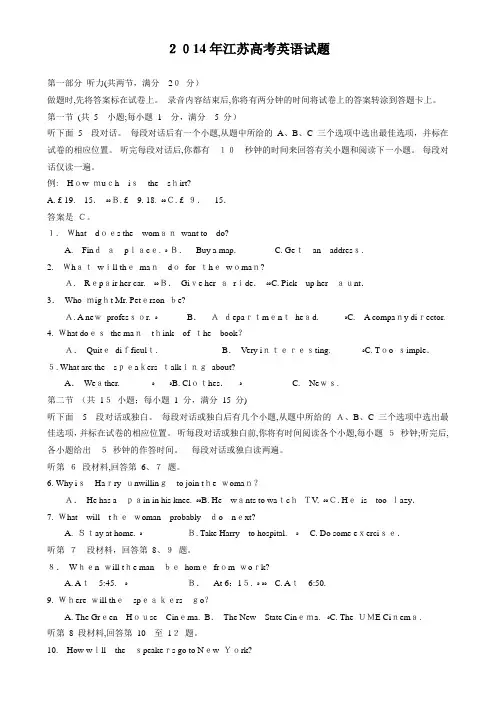
2014年江苏高考英语试题第一部分听力(共两节,满分20分)做题时,先将答案标在试卷上。
录音内容结束后,你将有两分钟的时间将试卷上的答案转涂到答题卡上。
第一节(共5小题;每小题1分,满分 5 分)听下面5段对话。
每段对话后有一个小题,从题中所给的A、B、C 三个选项中选出最佳选项,并标在试卷的相应位置。
听完每段对话后,你都有10秒钟的时间来回答有关小题和阅读下一小题。
每段对话仅读一遍。
例:How much isthe shirt?A. £ 19.15.ﻩﻩB. £9. 18. ﻩﻩC. £9.15.答案是C。
1.What does the womanwant to do?A.Findaplace. ﻩB.Buy a map. C. Getan address.2.Whatwill themandofor thewoman?A.Repair her car.ﻩﻩB.Give her aride.ﻩﻩC. Pick up heraunt.3.Who might Mr. Peterson be?A. A newprofessor. ﻩB.Adepartmenthead. ﻩC. A company director.4. What doesthe manthink of the book?A.Quitedifficult. B.Very interesting.ﻩC. Too simple.5. What are the speakers talkingabout?A.Weather.ﻩﻩB. Clothes.ﻩ C.News.第二节(共15小题;每小题1 分,满分15 分)听下面5段对话或独白。
每段对话或独白后有几个小题,从题中所给的A、B、C 三个选项中选出最佳选项,并标在试卷的相应位置。
听每段对话或独白前,你将有时间阅读各个小题,每小题5秒钟;听完后,各小题给出5秒钟的作答时间。
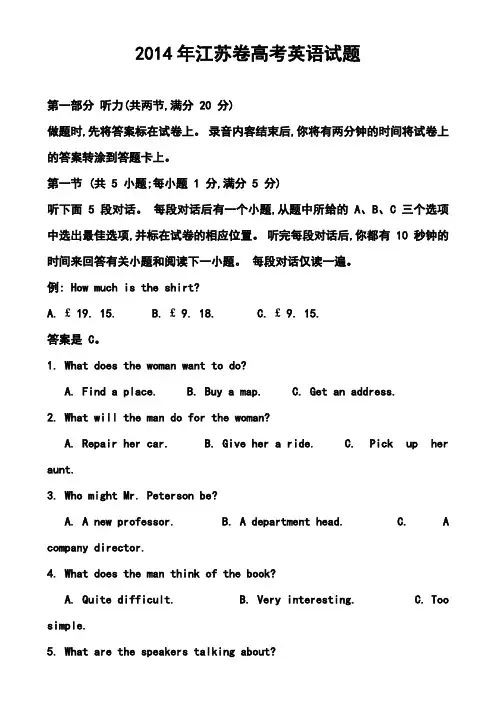
2014年江苏卷高考英语试题第一部分听力(共两节,满分 20 分)做题时,先将答案标在试卷上。
录音内容结束后,你将有两分钟的时间将试卷上的答案转涂到答题卡上。
第一节 (共 5 小题;每小题 1 分,满分 5 分)听下面 5 段对话。
每段对话后有一个小题,从题中所给的 A、B、C 三个选项中选出最佳选项,并标在试卷的相应位置。
听完每段对话后,你都有 10 秒钟的时间来回答有关小题和阅读下一小题。
每段对话仅读一遍。
例: How much is the shirt?A. £ 19. 15.B. £ 9. 18.C. £ 9. 15.答案是 C。
1. What does the woman want to do?A. Find a place.B. Buy a map.C. Get an address.2. What will the man do for the woman?A. Repair her car.B. Give her a ride.C. Pick up her aunt.3. Who might Mr. Peterson be?A. A new professor.B. A department head.C. A company director.4. What does the man think of the book?A. Quite difficult.B. Very interesting.C. Too simple.5. What are the speakers talking about?A. Weather.B. Clothes.C. News.第二节 (共 15 小题;每小题 1 分,满分 15 分)听下面 5 段对话或独白。
每段对话或独白后有几个小题,从题中所给的 A、B、C 三个选项中选出最佳选项,并标在试卷的相应位置。
听每段对话或独白前,你将有时间阅读各个小题,每小题 5 秒钟;听完后,各小题给出 5 秒钟的作答时间。
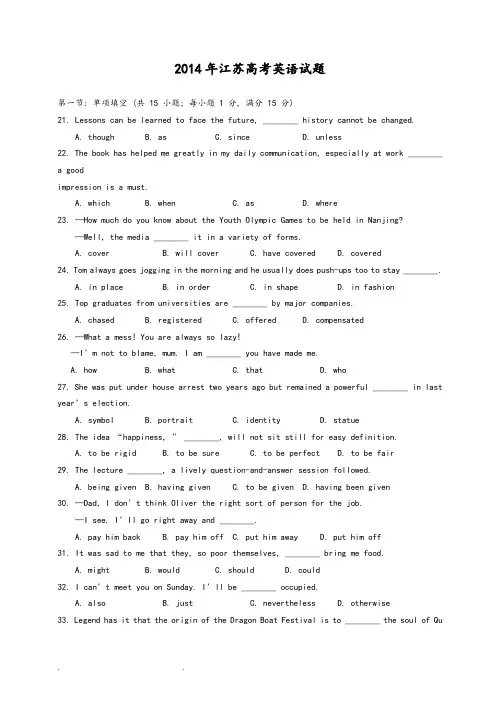
2014年江苏高考英语试题第一节: 单项填空 (共 15 小题; 每小题 1 分, 满分 15 分)21. Lessons can be learned to face the future, ________ history cannot be changed.A. thoughB. asC. sinceD. unless22. The book has helped me greatly in my daily communication, especially at work ________a goodimpression is a must.A. whichB. whenC. asD. where23. —How much do you know about the Youth Olympic Games to be held in Nanjing?—Well, the media ________ it in a variety of forms.A. coverB. will coverC. have coveredD. covered24. Tom always goes jogging in the morning and he usually does push-ups too to stay ________.A. in placeB. in orderC. in shapeD. in fashion25. Top graduates from universities are ________ by major companies.A. chasedB. registeredC. offeredD. compensated26. —What a mess! You are always so lazy!—I’m not to blame, mum. I am ________ you have made me.A. howB. whatC. thatD. who27. She was put under house arrest two years ago but remained a powerful ________ in last year’s election.A. symbolB. portraitC. identityD. statue28. The idea “happiness, ” ________, will not sit still for easy definition.A. to be rigidB. to be sureC. to be perfectD. to be fair29. The lecture ________, a lively question-and-answer session followed.A. being givenB. having givenC. to be givenD. having been given30. —Dad, I don’t think Oliver the right sort of person for the job.—I see. I’ll go right away and ________.A. pay him backB. pay him offC. put him awayD. put him off31. It was sad to me that they, so poor themselves, ________ bring me food.A. mightB. wouldC. shouldD. could32. I can’t meet you on Sunday. I’ll be ________ occupied.A. alsoB. justC. neverthelessD. otherwise33. Legend has it that the origin of the Dragon Boat Festival is to ________ the soul of QuYuan.A. rememberB. remindC. recoverD. recall34. Good families are much to all their members, but ________ to none.A. somethingB. anythingC. everythingD. nothing35. —________ ! Somebody has left the lab door open.—Don’t look at me.A. Dear meB. Hi, thereC. Thank goodnessD. Come on第二节: 完形填空 (共 20 小题; 每小题 1 分, 满分 20 分)Dale Carnegie rose from the unknown of a Missouri farm to international fame because he found a way to fill a universal human need.It was a need that he first 36 back in 1906 when young Dale was a junior at State Teachers College in Warrensburg. To get an 37 , he was struggling against many difficulties. His family was poor. His Dad couldn’t afford the 38 at college, so Dale had to ride horseback 12 miles to attend classes. Study had to be done 39 his farm-work routines. He withdrew from many school activities 40 he didn’t have the time or the 41 . He had only one good suit. He tried 42 the football team, but the coach turned him down for being too 43 . During this period Dale was slowly 44 an inferiority complex (自卑感), which his mother knew could 45 him from achieving his real potential. She 46 that Dale join the debating team, believing that 47 in speaking could give him the confidence and recognition that he needed.Dale took his mother’s advice, tried desperately and after several attempts 48 made it. This proved to be a 49 point in his life. Speaking before groups did help him gain the 50 he needed. By the time Dale was a senior, he had won every top honor in 51 . Now other students were coming to him for coaching and they, 52 , were winning contests.Out of this early struggle to 53 his feelings of inferiority, Dale came to understand that the ability to 54 an idea to an audience builds a person’s confidence. And, 55 it, Dale knew he could do anything he wanted to do—and so could others.36. A. admitted B. filled C. supplied D. recognized37. A. assignment B. education C. advantage D. instruction38. A. training B. board C. teaching D. equipment39. A. between B. during C. over D. through40. A. while B. when C. because D. though41. A. permits B. interest C. talent D. clothes42. A. on B. for C. in D. with43. A. light B. flexible C. optimistic D. outgoing44. A. gaining B. achieving C. developing D. obtaining45. A. prevent B. protect C. save D. free46. A. suggested B. demanded C. required D. insisted47. A. presence B. practice C. patience D. potential48. A. hopefully B. certainly C. finally D. naturally49. A. key B. breaking C. basic D. turning50. A. progress B. experience C. competence D. confidence51. A. horse-riding B. football C. speech D. farming52. A. in return B. in brief C. in turn D. in fact53. A. convey B. overcome C. understand D. build54. A. express B. stress C. contribute D. repeat55. A. besides B. beyond C. like D. with第三部分: 阅读理解 (共 15 小题; 每小题 2 分, 满分 30 分)请阅读下列短文, 从短文后各题所给的 A、B、C、D 四个选项中, 选出最佳选项, 并在答题卡上将该项涂黑。
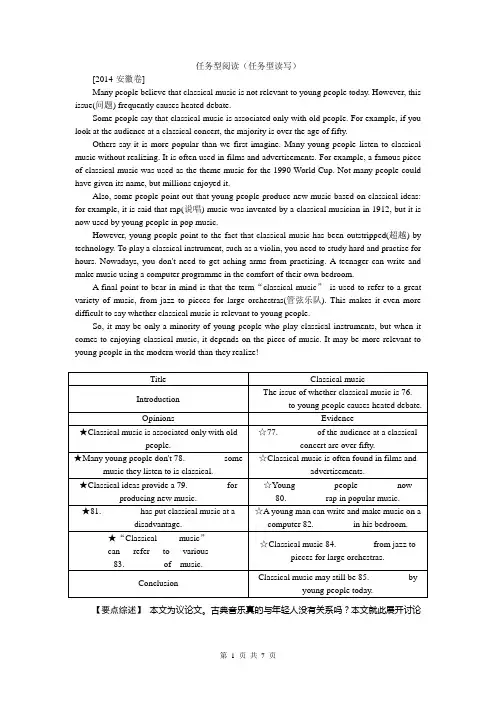
任务型阅读(任务型读写)[2014·安徽卷]Many people believe that classical music is not relevant to young people today. However, this issue(问题) frequently causes heated debate.Some people say that classical music is associated only with old people. For example, if you look at the audience at a classical concert, the majority is over the age of fifty.Others say it is more popular than we first imagine. Many young people listen to classical music without realizing. It is often used in films and advertisements. For example, a famous piece of classical music was used as the theme music for the 1990 World Cup. Not many people could have given its name, but millions enjoyed it.Also, some people point out that young people produce new music based on classical ideas: for example, it is said that rap(说唱) music was invented by a classical musician in 1912, but it is now used by young people in pop music.However, young people point to the fact that classical music has been outstripped(超越) by technology. To play a classical instrument, such as a violin, you need to study hard and practise for hours. Nowadays, you don't need to get aching arms from practising. A teenager can write and make music using a computer programme in the comfort of their own bedroom.A final point to bear in mind is that the term“classical music”is used to refer to a great variety of music, from jazz to pieces for large orchestras(管弦乐队). This makes it even more difficult to say whether classical music is relevant to young people.So, it may be only a minority of young people who play classical instruments, but when it comes to enjoying classical music, it depends on the piece of music. It may be more relevant to young people in the modern world than they realize!并列举众多不同的观点。
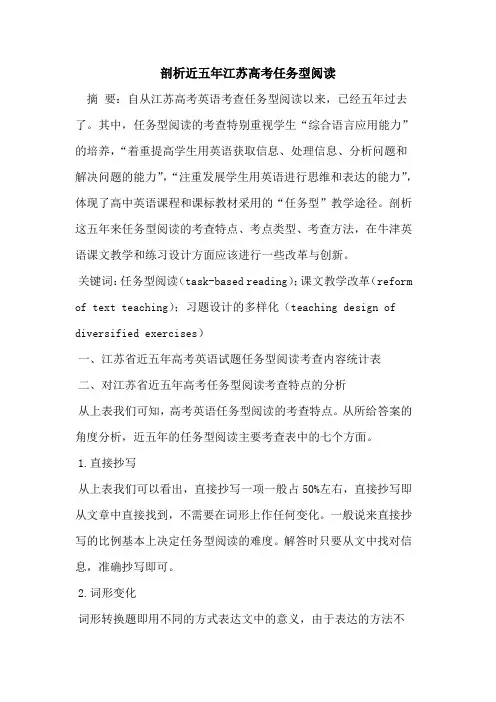
剖析近五年江苏高考任务型阅读摘要:自从江苏高考英语考查任务型阅读以来,已经五年过去了。
其中,任务型阅读的考查特别重视学生“综合语言应用能力”的培养,“着重提高学生用英语获取信息、处理信息、分析问题和解决问题的能力”,“注重发展学生用英语进行思维和表达的能力”,体现了高中英语课程和课标教材采用的“任务型”教学途径。
剖析这五年来任务型阅读的考查特点、考点类型、考查方法,在牛津英语课文教学和练习设计方面应该进行一些改革与创新。
关键词:任务型阅读(task-based reading);课文教学改革(reform of text teaching);习题设计的多样化(teaching design of diversified exercises)一、江苏省近五年高考英语试题任务型阅读考查内容统计表二、对江苏省近五年高考任务型阅读考查特点的分析从上表我们可知,高考英语任务型阅读的考查特点。
从所给答案的角度分析,近五年的任务型阅读主要考查表中的七个方面。
1.直接抄写从上表我们可以看出,直接抄写一项一般占50%左右,直接抄写即从文章中直接找到,不需要在词形上作任何变化。
一般说来直接抄写的比例基本上决定任务型阅读的难度。
解答时只要从文中找对信息,准确抄写即可。
2.词形变化词形转换题即用不同的方式表达文中的意义,由于表达的方法不同,所采用的词性会有所变化。
如,动词与名词的转换、动词与动名词的转换、形容词与副词的转换、名词与形容词的转换等。
如,2008年的a format for exchanging information转为exchange your information via format;又如,2010年的many birds migrate twice a year between summer homes and winter homes.转为one piece of evidence is the migration of many birds between their summer homes and winter homes.再如,2012年的76题 people who have a positive mind-set perform better...转为people perform better when thinking positively。
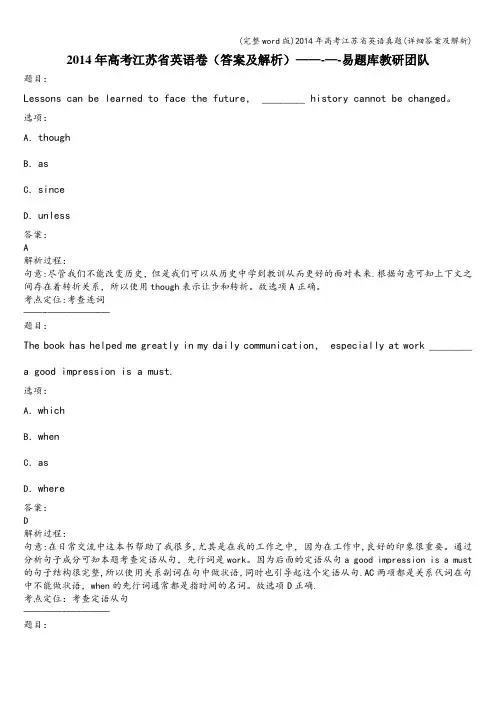
2014年高考江苏省英语卷(答案及解析)——-—-易题库教研团队题目:Lessons can be learned to face the future, ________ history cannot be changed。
选项:A.thoughB.asC.sinceD.unless答案:A解析过程:句意:尽管我们不能改变历史,但是我们可以从历史中学到教训从而更好的面对未来.根据句意可知上下文之间存在着转折关系,所以使用though表示让步和转折。
故选项A正确。
考点定位:考查连词——-—————-—题目:The book has helped me greatly in my daily communication, especially at work ________ a good impression is a must.选项:A.whichB.whenC.asD.where答案:D解析过程:句意:在日常交流中这本书帮助了我很多,尤其是在我的工作之中,因为在工作中,良好的印象很重要。
通过分析句子成分可知本题考查定语从句,先行词是work。
因为后面的定语从句a good impression is a must 的句子结构很完整,所以使用关系副词在句中做状语,同时也引导起这个定语从句.AC两项都是关系代词在句中不能做状语,when的先行词通常都是指时间的名词。
故选项D正确.考点定位:考查定语从句————-—-———题目:—How much do you know about the Youth Olympic Games to be held in Nanjing?-Well, the media ________ it in a variety of forms。
选项:A.coverB.will coverC.have coveredD.covered答案:C解析过程:句意:—你对即将在南京举行的青年奥运会了解多少?—了解的不少,媒体已经以多种形式对青年奥运会举进行了报道。
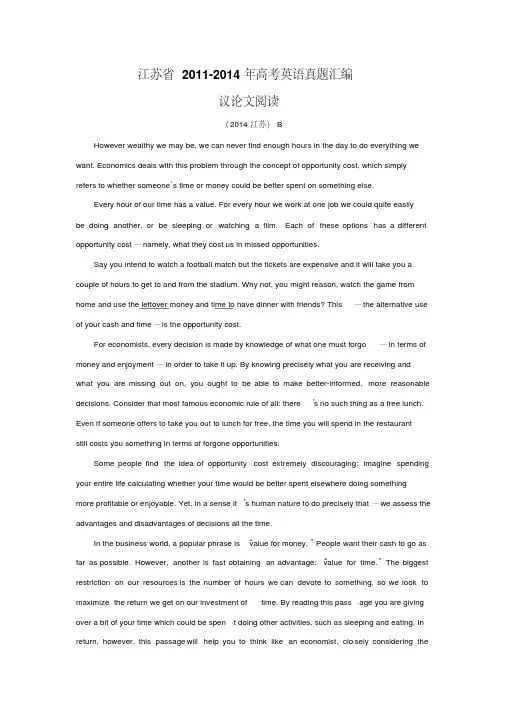
江苏省2011-2014年高考英语真题汇编议论文阅读(2014江苏)BHowever wealthy we may be, we can never find enough hours in the day to do everything we want. Economics deals with this problem through the concept of opportunity cost, which simply refers to whether someone’s time or money could be better spent on something else.Every hour of our time has a value. For every hour we work at one job we could quite easilybe doing another, or be sleeping or watching a film. Each of these options has a different opportunity cost—namely, what they cost us in missed opportunities.Say you intend to watch a football match but the tickets are expensive and it will take you a couple of hours to get to and from the stadium. Why not, you might reason, watch the game from home and use the leftover money and time to have dinner with friends? This—the alternative use of your cash and time—is the opportunity cost.For economists, every decision is made by knowledge of what one must forgo—in terms of money and enjoyment—in order to take it up. By knowing precisely what you are receiving and what you are missing out on, you ought to be able to make better-informed, more reasonable decisions. Consider that most famous economic rule of all: there’s no such thing as a free lunch. Even if someone offers to take you out to lunch for free, the time you will spend in the restaurantstill costs you something in terms of forgone opportunities.Some people find the idea of opportunity cost extremely discouraging: imagine spending your entire life calculating whether your time would be better spent elsewhere doing somethingmore profitable or enjoyable. Yet, in a sense it’s human nature to do precisely that—we assess the advantages and disadvantages of decisions all the time.In the business world, a popular phrase is “value for money.” People want their cash to go as far as possible. However, another is fast obtaining an advantage: “value for time.”The biggest restriction on our resources is the number of hours we can devote to something, so we look to maximize the return we get on our investment of time. By reading this pass age you are giving over a bit of your time which could be spen t doing other activities, such as sleeping and eating. In return, however, this passage will help you to think like an economist, clo sely considering the。
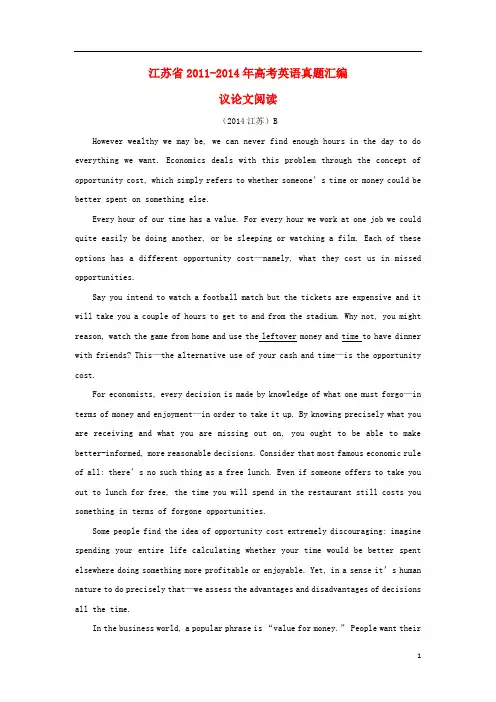
江苏省2011-2014年高考英语真题汇编议论文阅读(2014江苏)BHowever wealthy we may be, we can never find enough hours in the day to do everything we want. Economics deals with this problem through the concept of opportunity cost, which simply refers to whether someone’s time or money could be better spent on something else.Every hour of our time has a value. For every hour we work at one job we could quite easily be doing another, or be sleeping or watching a film. Each of these options has a different opportunity cost—namely, what they cost us in missed opportunities.Say you intend to watch a football match but the tickets are expensive and it will take you a couple of hours to get to and from the stadium. Why not, you might reason, watch the game from home and use the leftover money and time to have dinner with friends? This—the alternative use of your cash and time—is the opportunity cost.For economists, every decision is made by knowledge of what one must forgo—in terms of money and enjoyment—in order to take it up. By knowing precisely what you are receiving and what you are missing out on, you ought to be able to make better-informed, more reasonable decisions. Consider that most famous economic rule of all: there’s no such thing as a free lunch. Even if someone offers to take you out to lunch for free, the time you will spend in the restaurant still costs you something in terms of forgone opportunities.Some people find the idea of opportunity cost extremely discouraging: imagine spending your entire life calculating whether your time would be better spent elsewhere doing something more profitable or enjoyable. Yet, in a sense it’s human nature to do precisely that—we assess the advantages and disadvantages of decisions all the time.In the business world, a popular phrase is “value for money.”People want theircash to go as far as possible. However, another is fast obtaining an advantage: “value for time.”The biggest restriction on our resources is the number of hours we can devote to something, so we look to maximize the return we get on our investment of time. By reading this pass age you are giving over a bit of your time which could be spen t doing other activities, such as sleeping and eating. In return, however, this passage will help you to think like an economist, clo sely considering the opportunity cost of each of your decisions.【小题1】According to the passage, the concept of “opportunity cost”is applied to ________.A. making more moneyB. taking more opportunitiesC. reducing missed opportunitiesD. weighing the choice of opportunities【小题2】The “leftover ... time” in Paragraph 3 probably refers to the time ________.A. spared for watching the match at homeB. taken to have dinner with friendsC. spent on the way to and from the matchD. saved from not going to watch the m atch【小题3】What are forgone opportunities?A. Opportunities you forget in decision-making.B. Opportunities you give up for better ones.C. Opportunities you miss accidentally.D. Opportunities you make up for.【答案】58. D 59. C 60. B(2013江苏)BWe’ve considered several ways of paying to cut in line: hiring line standers, buying tickets from scalpers (票贩子), or purchasing line-cutting privileges directly from, say, an airline or an amusement park. Each of these deals replaces the morals of the queue (waiting your turn) with the morals of the market (paying a price for faster service).Markets and queues—paying and waiting—are two different ways of allocating things, and each is appropriate to different activities. The morals of the queue, “First come, first served, have an egalitarian (平等主义的) appeal. They tell us to ignore privilege, power, and deep pockets.The principle seems right on playgrounds and at bus stops. But the morals of the queue do not govern all occasions. If I put my house up for sale, I have no duty to accept the first offer that comes along, simply because it’s the first. Selling my house and waiting for a bus are different activities, properly governed by different standards.Sometimes standards change, and it is unclear which principle should apply. Think of the recorded message you hear, played over and over, as you wait on hold when calling your bank: “Your call will be answered in the order in which it was received.” This is essential for the morals of the queue. It’s as if the company is trying to ease our impatience with fairness.But don’t take the recorded message too seriously. Today, some people’s calls are answered faster than others. Call center technology enables companies to “score” incoming calls and to give faster service to those that come from rich places. You might call this telephonic queue jumping.Of course, markets and queues are not the only ways of allocating things. Some goods we distribute by merit, others by need, still others by chance. However, the tendency of markets to replace queues, and other non-market ways of allocating goods is so common in modern life that we scarcely notice it anymore. It is striking that most of the paid queue-jumping schemes we’ve considered—at airports and amusement parks, in call centers, doctors’ offices, and nat ional parks—are recent developments, scarcely imaginable three decades ago. The disappearance of the queues in these places may seem an unusual concern, but these are not the only places that markets have entered.58. According to the author, which of the following seems governed by the principle“First come, first served”?A. Taking buses.B. Buying houses.C. Flying with an airline.D. Visiting amusement parks.59. The example of the recorded message in Paragraphs 4 and 5 illustrates ______.A. the necessity of patience in queuingB. the advantage of modern technologyC. the uncertainty of allocation principleD. the fairness of telephonic services60. The passage is meant to ______.A. justify paying for faster servicesB. discuss the morals of allocating thingsC. analyze the reason for standing in lineD. criticize the behavior of queue jumping58. A 59. C 60. B(2013江苏)DMark Twain has been called the inventor of the American novel. And he surely deserves additional praise: the man who popularized the clever literary attack on racism.I say clever because anti-slavery fiction had been the important part of the literature in the years before the Civil War. H. B. Stowe’s Uncle Tom’s Cabin is only the most famous example. These early stories dealt directly with slavery. With minor exceptions, Twain planted his attacks on slavery and prejudice into tales that were on the surface about something else entirely. He drew his readers into the argument by drawing them into the story.Again and again, in the postwar years, Twain seemed forced to deal with the challenge of race. Consider the most controversial, at least today, of Twain’s novels, Adventures of Huckleberry Finn. Only a few books have been kicked off the shelves as often as Huckleberry Finn, Twain’s most widely read tale. Once upon a time, people hated the book because it struck them as rude. Twain himself wrote that those who banned the book considered the novel “trash and suitable only for the slums (贫民窟).” More recently the book has been attacked because of the character Jim, the escaped slave, and many occurences of the word nigger. (The term Nigger Jim, for which the novel is often severely criticized, never appears in it.) But the attacks were and are silly—and miss the point. The novel is strongly anti-slavery. Jim’s search through the slave states for the family from whom he has been forcibly parted is heroic. As J. Chadwick has pointed out, the character of Jim was a first in American fiction—a recognition that the slave had two personalities, “the voice of survival within a white slave culture and the voice of the individual: Jim, the father and the man.”There is much more. Twain’s mystery novel Pudd’nhead Wilson stood as achallenge to the racial beliefs of even many of the liberals of his day. Written at a time when the accepted wisdom held Negroes to be inferior (低等的) to whites, especially in intelligence, Twain’s tale centered in part around two babies switched at birth. A slave gave birth to her master’s baby and, for fear that the child should be sold South, switched him for the master’s baby by his wife. The slave’s lightskinned child was taken to be white and grew up with both the attitudes and the education of the slave-holding class. The master’s wife’s baby was taken for black and grew up with the attitudes and intonations of the slave.The point was difficult to miss: nurture (养育), not nature, was the key to social status. The features of the black man that provided the stuff of prejudice—manner of speech, for example— were, to Twain, indicative of nothing other than the conditioning that slavery forced on its victims.Twain’s r acial tone was not perfect. One is left uneasy, for example, by the lengthy passage in his autobiography (自传) about how much he loved what were called “nigger shows” in his youth—mostly with white men performing in black-face—and his delight in getting his mother to laugh at them. Yet there is no reason to think Twain saw the shows as representing reality. His frequent attacks on slavery and prejudice suggest his keen awareness that they did not.Was Twain a racist? Asking the question in the 21st century is as wise as asking the same of Lincoln. If we read the words and attitudes of the past through the “wisdom” of the considered moral judgments of the present, we will find nothing but error. Lincoln, who believed the black man the inferior of the white, fought and won a war to free him. And Twain, raised in a slave state, briefly a soldier, and inventor of Jim, may have done more to anger the nation over racial injustice and awaken its collective conscience than any other novelist in the past century.65. H ow do Twain’s novels on slavery differ from Stowe’s?A. Twain was more willing to deal with racism.B. Twain’s attack on racism was much less open.C. Twain’s themes seemed to agree with plots.D. Twain was openly concerned with racism.66. Recent criticism of Adventures of Huckleberry Finn arose partly from its ______.A. target readers at the bottomB. anti-slavery attitudeC. rather impolite languageD. frequent use of “nigger”67. What best proves Twain’s anti-slavery stand according to the author?A. J im’s search for his family was described in detail.B. The slave’s voice was first heard in American novels.C. Jim grew up into a man and a father in the white culture.D. Twain suspected that the slaves were less intelligent.68. The story of two babies switched mainly indicates that ______.A. slaves were forced to give up their babies to their mastersB. slaves’ babies could pick up slave-holders’ way of speakingC. blacks’ social position was shaped by how they were brought upD. blacks were born with certain features of prejudice69. What does the underlined word “they” in Paragraph 7 refer to?A. The attacks.B. Slavery and prejudice.C. White men.D. The shows.70. What does the author mainly argue for?A. Twain had done more than his contemporary writers to attack racism.B. Twain was an admirable figure comparable to Abraham Lincoln.C. Twain’s works had been banned on unreasonable grounds.D. Twain’s works should be read from a historical point of view.65. B 66. D 67. B68. C 69. D 70. A。
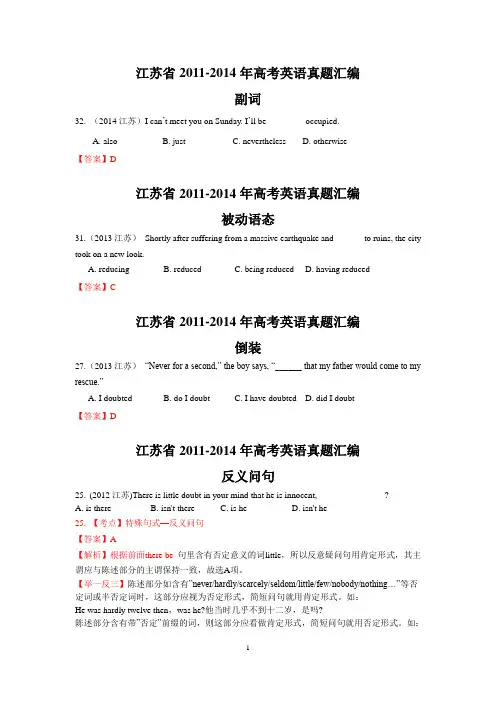
江苏省2011-2014年高考英语真题汇编副词32. (2014江苏)I can’t meet you on Sunday. I’ll be ________ occupied.A. alsoB. justC. neverthelessD. otherwise【答案】D江苏省2011-2014年高考英语真题汇编被动语态31.(2013江苏)Shortly after suffering from a massive earthquake and ______ to ruins, the city took on a new look.A. reducingB. reducedC. being reducedD. having reduced【答案】C江苏省2011-2014年高考英语真题汇编倒装27.(2013江苏)“Never for a second,” the boy says, “______ that my father would come to my rescue.”A. I doubtedB. do I doubtC. I have doubtedD. did I doubt【答案】D江苏省2011-2014年高考英语真题汇编反义问句25. (2012江苏)There is little doubt in your mind that he is innocent, _______________?A. is thereB. isn't thereC. is heD. isn't he25. 【考点】特殊句式—反义问句【答案】A【解析】根据前面there be 句里含有否定意义的词little,所以反意疑问句用肯定形式,其主谓应与陈述部分的主谓保持一致,故选A项。
【举一反三】陈述部分如含有”never/hardly/scarcely/seldom/little/few/nobody/nothing…”等否定词或半否定词时,这部分应视为否定形式,简短问句就用肯定形式。
江苏省2011-2014年高考英语真题汇编任务型阅读(2014江苏)The expression, “everybody’s doing it,”is very much at the center of the concept of peer pressure. It is a strong influence of a group, especially of children, on members of that group to behave as everybody else does. It can be positive or negative. Most people experience it in some way during their lives.People are social creatures by nature, and so it is hardly surprising that part of their self-respect comes from the approval of others. This instinct (天性) is why the approval of peers, or the fear of disapproval, is such a powerful force in many people’s lives. It is the same instinct that drives people to dress one way at home and another way at work, or to answer “fine” when a stranger asks “how are you?” even if it is not necessarily true. There is a practical aspect to this: it helps society to function efficiently, and encourages a general level of self-discipline that simplifies day-to-day interaction.For certain individuals, seeking social acceptance is so important that it becomes like an addiction; in order to satisfy the desire, they may go so far as to abandon their sense of right and wrong. Teens and young adults may feel forced to use drugs, or join gangs that encourage criminal behavior. Mature adults may sometimes feel pressured to cover up illegal activity at the company where they work, or end up in debt because they are unable to hold back the desire to buy a house or car that they can’t afford in an effort to “keep up with the Joneses.”However, peer pressure is not always negative. A student whose friends are good at academics may be urged to study harder and get good grades. Players on a sports team may feel driven to play harder in order to help the team win. This type of influence can also get a friend off drugs, or to help an adult take up a good habit or drop a bad one. Study groups and class projects are examples of positive peer groups that encourage people to better themselves.Schools try to teach kids about the dangers of negative peer pressure. They teach kids to stand up and be themselves, and encourage them to politely decline to do things that they believe are wrong. Similarly, it can be helpful to encourage children to greet the beneficial influence ofpositive peer groups.(2013江苏)Quiet Virtue: The ConscientiousThe everyday signs of conscientiousness (认真尽责)—being punctual, careful in doing work, self-disciplined, and scrupulous (一丝不苟的) in attending to responsibilities—are typical characteristics of the model organizational citizen, the people who keep things running as they should. They follow the rules, help out, and are concerned about the people they work with. It’sthe conscientious worker who helps newcomers or updates people who return after an absence, who gets to work on time and never abuses sick leaves, who always gets things done on deadline.Conscientiousness is a key to success in any field. In studies of job performance, outstanding effectiveness for almost all jobs, from semi-skilled labor to sales and management, depends on conscientiousness. It is particularly important for outstanding performance in jobs at the lower levels of an organization: the secretary whose message taking is perfect, the delivery truck driver who is always on time.Among sales representatives for a large American car manufacturer, those who were most conscientious had the largest volume of sales. Conscientiousness also offers a buffer (缓冲) against the threat of job loss in today’s constantly changing market, because employees with this quality are among the most valued. For the sales representatives, their level of conscientiousness mattered almost as much as their sales in determining who stayed on.There is an air around highly conscientious people that makes them seem even better than they actua lly are. Their reputation for dependability influences managers’ evaluations of their work, giving them higher evaluations than objective measures of their performance would predict.But conscientiousness in the absence of social skills can lead to problems. Since conscientious people demand so much of themselves, they can hold other people to their own standards, and so be overly judgmental when others don’t show the same high levels of model behavior. Factory workers in Great Britain and the United States who were extremely conscientious, for example, tended to criticize co-workers even about failures that seemed unimportant to those they criticized, which damaged their relationships.When conscientiousness takes the form of living up to expectations, it can discourage creativity. In creative professions like art or advertising, openness to wild ideas and spontaneity (自发性) are scarce and in demand. Success in such occupations calls for a balance, however; without enough conscientiousness to follow through, people become mere dreamers, with nothingto show for their imaginativeness.(2012江苏)"Happiness Advantage" EffectIn July 2010 Burt's Bees, a personal-care products company, was going through enormous change as it began a global expansion into 19 new countries. In this kind of high-pressure situation, many leaders bother their assistants with frequent meetings or flood their in-boxes with urgent demands. In doing so, managers lift everyone's anxiety level, which activates the part of the brain that processes threats and steals resources from the prefrontal cortex ( 大脑皮层) , which is responsible for effective problem solving.Burt's Bees's then-CEO, John Wolfgang, took a different approach. Each day, he'd send out an e-mail praising a team member for work related to global marketing. He'd interrupt his own presentations to remind his managers to talk with their teams about the company's values. He asked me to further a three-hour session with employees on happiness in the course of the expansion effort. As one member of the senior team told me a year later, Wolfgang's emphasis ontransformed the company into a global one.That outcome shouldn't surprise us. Research shows that when people work with a positivemind-set(思维模式), performance on nearly every level—productivity, creativity,involvement—improves. Yet happiness is perhaps the most misunderstood driver of performance.For one, most people believe that success comes before happiness. " Once I get a promotion, 111be happy," they think. Or, "Once I hit my sales target, IH feel great. " But because success is amoving target—as soon as you hit your target, you raise it again—the happiness that results fromsuccess does not last long.In fact, it works the other way around: People who have a positive mind-set perform better inthe face of challenge. I call this the "happiness advantage"—every business outcome showsimprovement when the brain is positive. I've observed this effect in my role as a researcher andlecturer in 48 countries on the connection between employee happiness and success. And I'm notalone: In an analysis of 225 academic studies, researchers found strong evidence ofcause-and-effect relationship between life satisfaction and successful business outcomes.Another common misunderstanding is that our genetics, our environment, or a combinationof the two determines how happy we are. To be sure, both factors have an impact. But one'sgeneral sense of well-being is surprisingly unstable. The habits you form, the way you interactwith colleagues, how you think about stress—all these can be managed to increase yourhappiness and your chances of success.(2011江苏)When Should a Leader Apologize and When Not?Why Difficult?When we wrong someone we know, even not intentionally, we are generally expected toapologize so as to improve the situation. But when we’re acting as leaders, the circumstances aredifferent. The act of apology is carried out not merely at the level of the individual but also at the level of the institution. It is a performance in which every expression matters and every word becomes part of the public record. Refusing to apologize can be smart, or it can be stupid. So, readiness to apologize can be seen as a sign of strong character or as a sign of weakness. A successful apology can turn hate into personal and organizational harmony—while an apology that is too little, too late, or too obviously strategic can bring on individual and institutional ruin. What, then, is to be done? How can leaders decide if and when to apologize publicly?Why Now?The question of whether leaders should apologize publicly has never been more urgent. During the last decade or so, the United States in particular has developed an apology culture—apologies of all kinds and for all sorts of wrongdoings are made far more frequently than before. More newspaper writers have written about the growing importance of public apologies. More articles, cartoons, advice columns, and radio and television programs have similarly dealt with the subject of private apologies.Why Bother?Why do we apologize? Why do we ever put ourselves in situations likely to be difficult, embarrassing, and even risky? Leaders who apologize publicly could be an easy target. They are expected to appear strong and capable. And whenever they make public statements of any kind, their individual and institutional reputations are in danger. Clearly, then, leaders should not apologize often or lightly. For a leader to express apology, there needs to be a good, strong reason. Leaders will publicly apologize if and when they think the costs of doing so are lower than the costs of not doing so.Why Refuse?Why is it that leaders so often refuse to apologize, even when a public apology seems to be in order? Their reasons can be individual or institutional. Because leaders are public figures, their apologies are likely to be personally uncomfortable and even professionally risky. Leaders may also be afraid that admission of a mistake will damage or destroy the organization for which they are responsible. There can be good reasons for hanging tough in tough situations, as we shall see,but it is a high-risk strategy.。
2014年江苏高考英语试题第一部分听力(共两节,满分20 分)做题时,先将答案标在试卷上。
录音内容结束后,你将有两分钟的时间将试卷上的答案转涂到答题卡上。
第一节(共5 小题;每小题1 分,满分5 分)听下面5 段对话。
每段对话后有一个小题,从题中所给的A、B、C 三个选项中选出最佳选项,并标在试卷的相应位置。
听完每段对话后,你都有10 秒钟的时间来回答有关小题和阅读下一小题。
每段对话仅读一遍。
例: How much is the shirt?A. £ 19. 15.B. £ 9. 18.C. £ 9. 15.答案是C。
1. What does the woman want to do?A. Find a place.B. Buy a map.C. Get an address.2. What will the man do for the woman?A. Repair her car.B. Give her a ride.C. Pick up her aunt.3. Who might Mr. Peterson be?A. A new professor.B. A department head.C. A company director.4. What does the man think of the book?A. Quite difficult.B. Very interesting.C. Too simple.5. What are the speakers talking about?A. Weather.B. Clothes.C. News.第二节(共15 小题;每小题 1 分,满分15 分)听下面5 段对话或独白。
每段对话或独白后有几个小题,从题中所给的A、B、C 三个选项中选出最佳选项,并标在试卷的相应位置。
听每段对话或独白前,你将有时间阅读各个小题,每小题5 秒钟;听完后,各小题给出 5 秒钟的作答时间。
s江苏省2011-2014年高考英语真题汇编日常生活类阅读(2012江苏)CMedical drugs sometimes cause more damage than they cure. One solution to this problem is to put the drugs inside a capsule, protecting them from the body—and the body from them—until they can be released at just the right spot. There are lots of ways to trigger(引发) this release, including changing temperature, acidity, and so on. But triggers can come with their own risks—burns, for example. Now, researchers in California have designed what could be a harmless trigger to date: shining near-infrared light (NIR,近红外线) on the drug in the capsule.The idea of using light to liberate the drug in the capsule isn't new. Researchers around the globe have developed polymers (聚合物) and other materials that begin to break down when they absorb cither ultraviolet (UV,紫外线) or visible light. But tissues also readily absorb UV and visible light, which means the drug release can be triggered only near the skin, where the light can reach the capsule. NIR light largely passes through tissues, so researchers have tried to use it as a trigger. But few compounds(化合物) absorb NIR well and go through chemical changes.That changed last year when Adah Almutairi, a chemist at the University of California, San Diego, reported that she and her colleagues had designed a polymer that breaks down when it absorbs NIR light. Their polymer used a commercially available NIR-absorbing group called o-nitrobenzyl (ONB). When they catch the light, ONB groups fall off the polymer, leading to its breakdown. But ONB is only a so-so NIR absorber, and it could be poisonous to cells when it separates from the polymer.So Almutairi and her colleagues reported creating a new material for capsules that's even better. This one consists of a long chain of compounds called cresol groups linked in a polymer. Cresol contains reactive(易反应的) components that make it highly unstable in its polymeric form, a feature Almutairi and her colleagues use to their advantage. After polymerizing the cresols, they cap each reactive component with a light-absorbing compound called Bhc. When the Bhcs absorb NIR light, the reactive groups are exposed and break the long polymer into two short chains. Shining additional light continues this breakdown, potentially releasing any drugs in the capsule. What's more, Almutairi says, Bhc is 10 times better at absorbing NIR than is ONB and is not poisonous to cells.63. According to the passage, which of the following could be the best trigger?A. Temperature change.B. NIR light.C. Acidity change.D. UV light.64. Why in ONB unsatisfactory?A. It breaks down when it absorbs NIR light.B. It falls off the polymer and triggers drug release.C. It has not come onto the market up till now.D. It is not effective enough and could be poisonous.65. Which word can be used to complete the following process of changes?A. ProtectedB. formedC. exposedD. combined【考点】日常生活类—说明文【文章大意】。
江苏省2011-2014年高考英语真题汇编完形填空题〔2014江苏〕Dale Carnegie rose from the unknown of a Missouri farm to international fame because hefound a way to fill a universal human need.It was a need that he first 36 back in 1906 when young Dale was a junior at StateTeachers College in Warrensburg. To get an 37, he was struggling against many difficulties. His family was poor. His Dad couldn’t afford the 38 at college, so Dale had to ride horseback 12 miles to attend classes. Study had to be done 39 his farm-work routines. He withdrew from many school activities 40 he didn’t have the time or the 41 . He had only one good suit. He tried 42 the football team, but the coach turned him down for being too 43. During this period Dale was slowly 44 an inferiority complex (自卑感), which his mother knew could 45 him from achieving his real potential. She 46 that Dale join the debating team,believing that 47 in speaking could give him the confidence and recognition that he needed.Dale took his mother’s advice, tried desperately and after several attempts 48 made it. This proved to be a 49 point in his life. Speaking before groups did help him gain the 50 heneeded. By the time Dale was a senior, he had won every top honor in 51 . Now other studentswere coming to him for coaching and they, 52, were winning contests.Out of this early struggle to 53 his feelings of inferiority, Dale came to understand that the ability to 54 an idea to an audience builds a person’s confidence. And, 55 it, Dale knew he could do anything he wanted to do—and so could others.【小题1】A. admitted B. filled C. supplied D. recognized【小题2】A. assignment B. education C. advantage D. instruction【小题3】A. training B. board C. teaching D. equipment【小题4】A. between B. during C. over D. through【小题5】A. while B. when C. because D. though【小题6】 A. permits B. interestC. talent D. clothes【小题7】A. on B. for C. in D. with【小题8】A. light B. flexibleC. optimistic D. outgoing【小题9】A. gaining B. achieving C. developing D. obtaining【小题10】A. prevent B. protect C. save D. free【小题11】A. suggested B. demandedC. required D. insisted【小题12】A. presence B. practice C. patience D. potential【小题13】A. hopefully B. certainly C. finally D. naturally【小题14】A. key B. breaking C. basic D. turning【小题15】 A. progress B. experience C. competence D. confidence【小题16】A. horse-riding B. football C. speech D. farming【小题17】A. in return B. in brief C. in turn D. in fact【小题18】A. convey B. overcomeC. understand D. build【小题19】A. express B. stress C. contribute D. repeat【小题20】A. besides B. beyond C. like D. with36. D 37. B 38. B 39. A 40. C41. D 42. B 43. A 44. C 45. A 46. A 47. B 48. C 49. D 50. D51. C 52. C 53. B 54. A 55. D〔2013江苏〕I used to believe in the American Dream, which meant a job, a mortgage (按揭), credit cards, success. I wanted it and worked toward it like everyone else, all of us 36 chasing the same thing.One year, through a series of unhappy events, it all fell 37 . I found myself homeless and alone. I had my truck and $ 56. I 38 the countryside for some place I could rent for the 39 possible amount. I came upon a shabby house four miles up a winding mountain road 40 the Potomac River in West Virginia. It was 41 , full of broken glass and rubbish. I found theowner, rented it, and 42 a corner to camp in.The locals knew nothing about me, 43 slowly, they started teaching me the44 of being a neighbor. They dropped off blankets, candles, and tools, and began45 around to chat. They started to teach me a belief in a 46 American Dream—not the one of individual achievement but of 47 .What I had believed in, all those things I thought were 48 for a civilizedlife, were nonexistent in this place. 49 on the mountain, my most valuable possessions were my 50 with my neighbors.Four years later, I moved back into 51 . I saw many people were having a really hard time, 52 their jobs and homes. I managed to rent a big enough house to 53 a handful of people. There are four of us now in the house, but over time I’ve had nine people com e in and move on to other places. We’d all be in 54 if we hadn’t banded together.The American Dream I believe in now is a shared one. It’s not so much about what I can get for myself; it’s about 55 we can all get by together.36. A. separately B. equally C. violently D. naturally37. A. off B. apart C. over D. out38. A. crossed B. left C. toured D. searched39. A. fullest B. largest C. fairest D. cheapest40. A. at B. through C. over D. round41. A. occupied B. abandoned C. emptied D. robbed42. A. turned B. approached C. cleared D. cut43. A. but B. although C. otherwise D. for44. A. benefit B. lesson C. nature D. art45. A. sticking B. looking C. swinging D. turning46. A. wild B. real C. different D. remote47. A. neighborliness B. happiness C. friendliness D. kindness48. A. unique B. expensive C. rare D. necessary49. A. Up B. Down C. Deep D. Along50. A. cooperation B. relationships C. satisfaction D. appointments51. A. reality B. society C. town D. life52. A. creating B. losing C. quitting D. offering53. A. put in B. turn in C. take in D. get in54. A. yards B. shelters C. camps D. cottages55. A. when B. what C. whether D. how36. A37. B 38. D39. D40. C41. B42. C43. A 44. D45. A 46. C47. A48. D49. A50. B51. C 52. B53. C54. B55. D(2012江苏)The concept of solitude (独处) in the digital world is almost non-existent. In the world ofdigital technology, e-mail, social networking and online video games, information is meant to be36 . Solitude can be hard to discover 37 it has been given up. In this respect, newtechnologies have 38 our culture.The desire to be connected has brought solitude to a ( n) 39 as we've known it. Peoplehave become so 40 in the world of networks and connections that one can often be contacted41 they'd rather not be. Today we can talk, text, e-mail, chat and blog(写博客),not onlyfrom our 42 but from our mobile phones as well.Most developed nations have become 43 on digital technology simply because they've grownaccustomed to it, and at this point not 44 it would make them an outsider.45 , many jobsand careers require people to be 46 . From this point of view, technology has changed theculture of work. Being reachable might feel like a 47 to those who may not want to be able to becontacted at all times.I suppose the positive side is that solitude is still possible for anyone who48 wants it puters can be shut 49 and mobile phones can be turned off. The ability to be "connected"and "on" has many 50 , as well as disadvantages. Travelers have ended up 51 onmountains, and mobile phones have saved countless lives. They can also make people feel 52and forced to answer unwanted calls or 53 to unwanted texts.Attitudes towards our connectedness as a society 54 across generations. Some find today'stechnology a gift. Others consider it a curse. Regardless of anyone's view on the subject, it's hard toimagine what life would be like 55 daily advancements in technology.36. A. updated B. received C. shared D. collected37. A. though B. until C. once D. before38. A. respected B. shapedC. ignored D. preserved39. A. edgeB. stageC. end D. balance40. A. sensitive B. intelligent C. considerate D. reachable41. A. even if B. only if C. as if D. if only42. A. media B. computes C. databases D. monitors43. A. bent B. hard C. keen D. dependent43. A. bentB. hardC. keen D. dependent44. A. finding B. using C. protecting D. changing45. A. Also B. Instead C. Otherwise D. Somehow46. A. connected B. trained C. recommended D. interested47. A. pleasureB. benefit C. burden D. disappointment48. A. slightly B. hardly C. merely D. really49. A. out B. down C. up D. in50. A. aspects B. weaknesses C. advantages D. exceptions51. A. hidden B. lost C. relaxed D. deserted52. A. trapped B. excitcd C. confused D. amused53. A. turn B. submit C. object D. reply54. A. vary B. arise C. spread D. exist55. A. beyond B. within C. despite D. without 【考点】科技类—议论文【文章大意】在现代社会中,由于数码技术的开展,我们独处的概念几乎不复存在。
2014年江苏高考英语试题第一部分听力(共两节,满分20 分)做题时,先将答案标在试卷上。
录音内容结束后,你将有两分钟的时间将试卷上的答案转涂到答题卡上。
第一节(共5 小题;每小题1 分,满分5 分)听下面 5 段对话。
每段对话后有一个小题,从题中所给的A、B、C 三个选项中选出最佳选项,并标在试卷的相应位置。
听完每段对话后,你都有10 秒钟的时间来回答有关小题和阅读下一小题。
每段对话仅读一遍。
例: How much is the shirt?A. £ 19. 15.B. £ 9. 18.C. £ 9. 15.答案是C。
1. What does the woman want to do?A. Find a place.B. Buy a map.C. Get an address.2. What will the man do for the woman?A. Repair her car.B. Give her a ride.C. Pick up her aunt.3. Who might Mr. Peterson be?A. A new professor.B. A department head.C. A company director.4. What does the man think of the book?A. Quite difficult.B. Very interesting.C. Too simple.5. What are the speakers talking about?A. Weather.B. Clothes.C. News.第二节(共15 小题;每小题 1 分,满分15 分)听下面5 段对话或独白。
每段对话或独白后有几个小题,从题中所给的A、B、C 三个选项中选出最佳选项,并标在试卷的相应位置。
听每段对话或独白前,你将有时间阅读各个小题,每小题5 秒钟;听完后,各小题给出5 秒钟的作答时间。
2014年江苏高考英语试题第一部分听力(共两节,满分20 分)做题时,先将答案标在试卷上. 录音内容结束后,你将有两分钟的时间将试卷上的答案转涂到答题卡上。
第一节(共5 小题;每小题 1 分,满分 5 分)听下面5 段对话。
每段对话后有一个小题,从题中所给的A、B、C 三个选项中选出最佳选项,并标在试卷的相应位置。
听完每段对话后,你都有10 秒钟的时间来回答有关小题和阅读下一小题。
每段对话仅读一遍。
例:How much is the shirt?A。
£ 19. 15. B. £ 9。
18。
C. £ 9。
15。
答案是C。
1. What does the woman want to do?A。
Find a place。
B。
Buy a map。
C. Get an address。
2。
What will the man do for the woman?A. Repair her car. B。
Give her a ride。
C。
Pick up her aunt.3。
Who might Mr. Peterson be?A。
A new professor. B. A department head。
C. A company director。
4. What does the man think of the book?A。
Quite difficult. B. Very interesting. C. Too simple.5. What are the speakers talking about?A。
Weather. B. Clothes。
C。
News。
第二节(共15 小题;每小题 1 分,满分15 分)听下面5 段对话或独白。
每段对话或独白后有几个小题,从题中所给的A、B、C 三个选项中选出最佳选项,并标在试卷的相应位置。
听每段对话或独白前,你将有时间阅读各个小题,每小题 5 秒钟;听完后,各小题给出 5 秒钟的作答时间。
江苏省2011-2014年高考英语真题汇编任务型阅读(2014江苏)The expression, “everybody’s doing it,” is very much at the center of the concept of peer pressure. It is a strong influence of a group, especially of children, on members of that group to behave as everybody else does. It can be positive or negative. Most people experience it in some way during their lives.People are social creatures by nature, and so it is hardly surprising that part of their self-respect comes from the approval of others. This instinct (天性) is why the approval of peers, or the fear of disapproval, is such a powerful force in many people’s lives. It is the same instinct that drives people to dress one way at home and another way at work, or to answer “fine” when a stranger asks “how are you?”even if it is not necessarily true. There is a practical aspect to this: it helps society to function efficiently, and encourages a general level of self-discipline that simplifies day-to-day interaction.For certain individuals, seeking social acceptance is so important that it becomes like an addiction; in order to satisfy the desire, they may go so far as to abandon their sense of right and wrong. Teens and young adults may feel forced to use drugs, or join gangs that encourage criminal behavior. Mature adults may sometimes feel pressured to cover up illegal activity at the company where they work, or end up in debt because they are unable to hold back the desire to buy a house or car that they can’t afford in an effort to “keep up with the Joneses.”However, peer pressure is not always negative. A student whose friends are good at academics may be urged to study harder and get good grades. Players on a sports team may feel driven to play harder in order to help the team win. This type of influence can also get a friend off drugs, or to help an adult take up a good habit or drop a bad one. Study groups and class projects are examples of positive peer groups that encourage people to better themselves.Schools try to teach kids about the dangers of negative peer pressure. They teachkids to stand up and be themselves, and encourage them to politely decline to do things that they believe are wrong. Similarly, it can be helpful to encourage children to greet the beneficial influence of positive peer groups.71. feeling 72. influences 73. practical 74. unconsciously75. individuals 76. moral 77. spirit 78. habits79. independent 80. no(2013江苏)Quiet Virtue: The ConscientiousThe everyday signs of conscientiousness (认真尽责)—being punctual, careful in doing work, self-disciplined, and scrupulous (一丝不苟的) in attending to responsibilities—are typical characteristics of the model organizational citizen, the people who keep things running as they should. They follow the rules, help out, and are concerned about the people they work with. It’s the conscientious worker who helps newcomers or updates people who return after an absence, who gets to workon time and never abuses sick leaves, who always gets things done on deadline.Conscientiousness is a key to success in any field. In studies of job performance, outstanding effectiveness for almost all jobs, from semi-skilled labor to sales and management, depends on conscientiousness. It is particularly important for outstanding performance in jobs at the lower levels of an organization: the secretary whose message taking is perfect, the delivery truck driver who is always on time.Among sales representatives for a large American car manufacturer, those who were most conscientious had the largest volume of sales. Conscientiousness also offers a buffer (缓冲) against the threat of job loss in today’s constantly changing market, because employees with this quality are among the most valued. For the sales representatives, their level of conscientiousness mattered almost as much as their sales in determining who stayed on.There is an air around highly conscientious people that makes them seem even better than they actually are. Their reputation for dependability influences managers’ evaluations of their work, giving them higher evaluations than objective measures of their performance would predict.But conscientiousness in the absence of social skills can lead to problems. Since conscientious people demand so much of themselves, they can hold other people to their own standards, and so be overly judgmental when others don’t show the same high levels of model behavior. Factory workers in Great Britain and the United States who were extremely conscientious, for example, tended to criticize co-workers even about failures that seemed unimportant to those they criticized, which damaged their relationships.When conscientiousness takes the form of living up to expectations, it can discourage creativity. In creative professions like art or advertising, openness to wild ideas and spontaneity (自发性) are scarce and in demand. Success in such occupations calls for a balance, however; without enough conscientiousness to follow through, people become mere dreamers, with nothing to show for their imaginativeness.(2012江苏)"Happiness Advantage" EffectIn July 2010 Burt's Bees, a personal-care products company, was going through enormous change as it began a global expansion into 19 new countries. In this kindof high-pressure situation, many leaders bother their assistants with frequentmeetings or flood their in-boxes with urgent demands. In doing so, managers lift everyone's anxiety level, which activates the part of the brain that processes threats and steals resources from the prefrontal cortex ( 大脑皮层) , which is responsible for effective problem solving.Burt's Bees's then-CEO, John Wolfgang, took a different approach. Each day, he'd send out an e-mail praising a team member for work related to global marketing. He'd interrupt his own presentations to remind his managers to talk with their teams about the company's values. He asked me to further a three-hour session with employees on happiness in the course of the expansion effort. As one member of the senior team told me a year later, Wolfgang's emphasis on developing positive leadership kept his managers actively involved and loyal as they successfully transformed the company into a global one.That outcome shouldn't surprise us. Research shows that when people work with a positive mind-set(思维模式), performance on nearly every level—productivity, creativity, involvement—improves. Yet happiness is perhaps the most misunderstood driver of performance. For one, most people believe that success comes before happiness. " Once I get a promotion, 111 be happy," they think. Or, "Once I hit my sales target, IH feel great. " But because success is a moving target—as soon as you hit your target, you raise it again—the happiness that results from success does not last long.In fact, it works the other way around: People who have a positive mind-set perform better in the face of challenge. I call this the "happiness advantage"—every business outcome shows improvement when the brain is positive. I've observed this effect in my role as a researcher and lecturer in 48 countries on the connection between employee happiness and success. And I'm not alone: In an analysis of 225 academic studies, researchers found strong evidence of cause-and-effect relationship between life satisfaction and successful business outcomes.Another common misunderstanding is that our genetics, our environment, or a combination of the two determines how happy we are. To be sure, both factors have an impact. But one's general sense of well-being is surprisingly unstable. The habits you form, the way you interact with colleagues, how you think about stress—all these can be managed to increase your happiness and your chances of success.71.【答案】bother/ annoy【试题解析】many leaders bother their assistants with frequent meetings or flood their in-boxes with urgent demands.72.【答案】anxiety/ conern/ worry【试题解析】In doing so, managers lift everyone's anxiety level,73.【答案】considerate/ aware/ conscious【试题解析】根据文章“Burt's Bees's then-CEO, John Wolfgang, took a different approach.”他用了不同的方法。